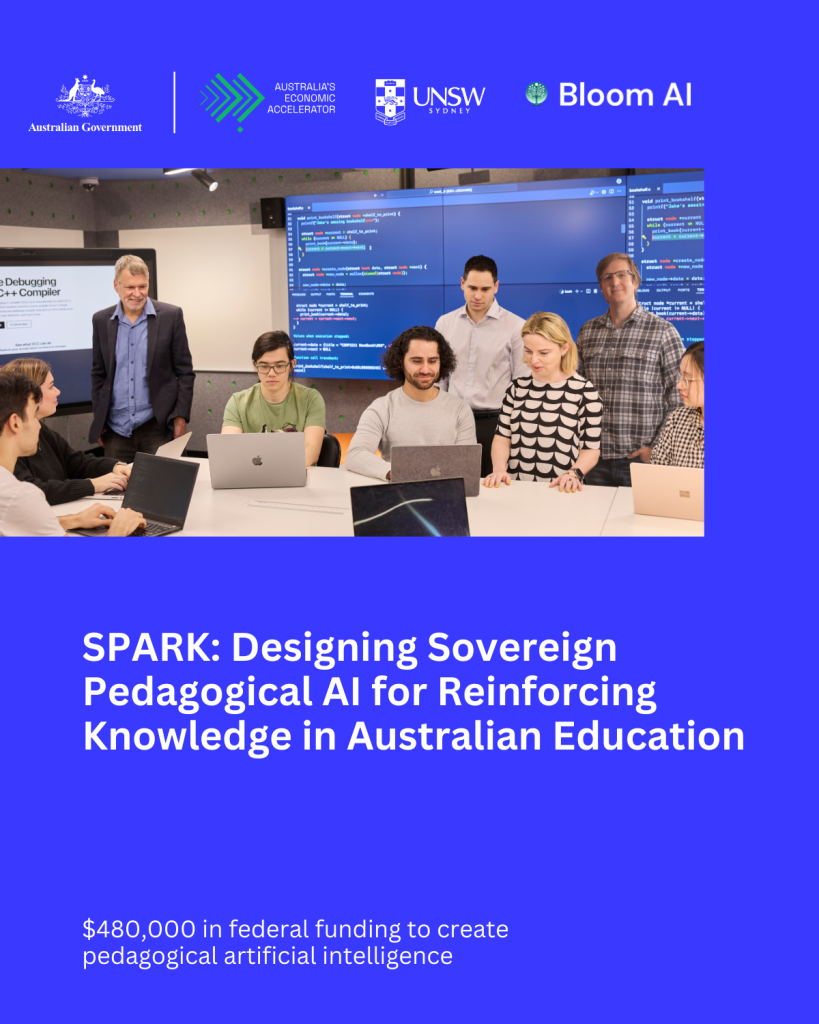Sydney, Australia – 29 March 2025 – We’re excited to announce that Bloom AI, in collaboration with UNSW Sydney, has secured a $480,000 Ignite grant from Australia’s Economic Accelerator (AEA) to develop “SPARK: Sovereign Pedagogical AI for Reinforcing Knowledge.” AEA is a $1.6 billion Australian Government initiative focused on commercialising cutting-edge academic research. SPARK was funded under AEA’s priority area of “Enabling Capabilities,” reflecting its strategic importance to Australia’s innovation agenda. See the full list of successful projects here.

Solving challenges of AI in education
Applying Large Language Models (LLMs) effectively in education faces several key challenges. Current LLMs aren’t specifically trained for educational purposes and often provide overly helpful responses that limit student learning. Additionally, these models can produce inaccurate or biased outputs (“hallucinations”). For many countries, including Australia, a further challenge is that most LLMs are developed overseas, meaning they may not align with local educational values, standards, or curriculum requirements.
Our project aims to solve this by developing, deploying and evaluating sovereign, pedagogical artificial intelligence (AI) for Australia’s education sector. With this, we aim to unlock the potential for AI to deliver personalised, scalable, and equitable learning experiences.
We will explore multiple approaches, including supervised fine-tuning (SFT), retrieval-augmented generation (RAG), and intent classification. SPARK will initially focus on computing education, directly improving student engagement, reducing educator workload, and supporting ethical AI use in Australian classrooms. SPARK aligns closely with several key strategic initiatives such as the Australian Universities Accord, the 2023-2030 Australian Cyber Security Strategy, and Australia’s Artificial Intelligence Action Plan.
Benefits for students and educators
For students, AI has the potential to deliver personalised, one-on-one support, tailoring explanations and feedback to each learner’s context, pace, and level of understanding. This kind of adaptive assistance may help reinforce knowledge, increase confidence, and provide a safe space for asking questions. Used thoughtfully, AI could support improved learning outcomes, especially for students who may not have consistent access to human support.
AI also opens up the possibility of making high-quality education more inclusive and equitable. With low cost to access and the ability to scale, AI could extend learning support to underserved communities, including students in regional and remote areas, learners with disabilities, and those from diverse cultural and socio-economic backgrounds.
For educators, AI holds promise as a way to reduce repetitive tasks—such as answering frequently asked questions or reviewing foundational concepts—freeing up time for deeper teaching, student engagement, and creative planning.
Team and collaboration
Gary Liang, Founder of Bloom AI, said, “I’m excited to be working with UNSW to build AI that has a positive impact on learning. This project positions Australia at the forefront of AI innovation.”
Dr. Sasha Vassar, Senior Lecturer at UNSW, added, “This funding is critical to ensure we understand the pedagogical implications of using AI in the classroom, to help build safer models.”
This collaboration brings together Bloom AI’s experience deploying AI tutors in real-world classrooms with the award-winning research expertise of the UNSW team.
The UNSW team includes Lorenzo Lee Solano (PhD Candidate), Jake Renzella (Senior Lecturer), Sasha Vassar (Senior Lecturer), Hammond Pearce (Lecturer), and Andrew Taylor (Associate Professor) from UNSW’s School of Computer Science and Engineering.
For further information, please contact: Gary Liang, Founder, Bloom AI, [email protected]
